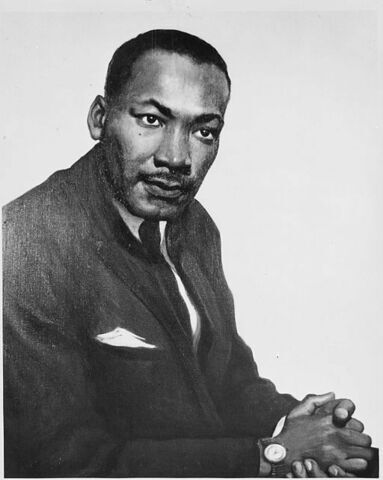This article originally ran on LDS Living in January 2020.
It’s a sweltering early-autumn afternoon on September 23, 2016, and my sister and I are driving through the streets of Montgomery, Alabama, on our way to the Reverend Dr. Martin Luther King Jr.’s home.
Dr. King lived in Montgomery between 1954 and 1960, the same period of time as the 1955–56 bus boycott that launched the civil rights movement.
At first glance, the white wooden house with a brick pathway leading to the front porch appears to be nothing out of the ordinary. Only, the charming exterior is far from your typical Southern porch, as it was marred by an explosive that white supremacists tossed at the home while Dr. King was preaching at a nearby church. Dr. King’s wife, Coretta Scott King, and their 7-month-old daughter Yolanda were home at the time, though neither were injured in the attack.
Our tour guide, an 86-year-old Black woman, leads us inside. She shows us a small living room, a study, a dining room, and a telephone—King often was bombarded with death threats through calls.
In the yellow-painted kitchen there is a small oven with a kettle on the stove, a sink, a window, a refrigerator, and a table.

The room is silent as our tour guide plays a recording of Dr. King’s voice for us.
“It was around midnight. You can have some strange experiences at midnight,” he says through the recording. It was January 1956 at the time, and Dr. King had just received yet another threat. The voice on the other end had called him an offensive name, followed by, “ . . . [We] are tired of you and your mess now. And if you aren’t out of this town in three days, we’re going to blow your brains out and blow up your house.”
Dr. King's voice shares how that message shook him to the very core.
“I sat there and thought about a beautiful little daughter who had just been born. . . . She was the darling of my life. I’d come in night after night and see that little gentle smile. And I sat at that table thinking about that little girl and thinking about the fact that she could be taken away from me any minute. . . . And I discovered then that religion had to become real to me, and I had to know God for myself. And I bowed down over that cup of coffee, I never will forget it . . . I prayed a prayer, and I prayed out loud that night.
“I said, ‘Lord, I’m down here trying to do what’s right. I think I’m right. I think the cause that we represent is right. But Lord, I must confess that I’m awake now. I’m faltering. I’m losing my courage. And I can’t let the people see me like this, because if they see me weak and losing my courage, they will begin to get weak.’ Then it happened: And it seemed at that moment that I could hear an inner voice saying to me, ‘Martin Luther, stand up for righteousness. Stand up for justice. Stand up for truth. And lo I will be with you, even until the end of the world.’ . . . I heard the voice of Jesus saying still to fight on. He promised never to leave me, never to leave me alone. No never alone. No never alone. He promised never to leave me, never to leave me alone.”
Our tour guide clicks off the recording, but Dr. King’s voice lingers, filling every nook and cranny of the house.

Suddenly, I understand. I feel for the very first time the undeniable fear Dr. King must have felt for his life not just once, but likely every minute of every day. I think of his wife and his baby girl and how cruel it was that he ultimately was taken from them and his additional three children. I imagine Dr. King sitting at that tiny kitchen table, his head bowed over a cup of coffee as he calls out to God—and suddenly I ache for him.
But at the same time, as light filters through the kitchen window at my back, I also feel enveloped in an undeniable and powerful warmth of what I can only describe as love.
Our tour guide shows my sister and me to the back door, but before we leave, the guide folds me into a hug. The skin behind her shirt is soft and warm, and the memory of it is so real to me that I can still feel her body beneath my arms even now—years later. I tower over her tiny frame. Her hair is so sparse that I can see her scalp beneath it and age spots cover her face. I am struck all of a sudden by how beautiful she is, this woman who grew up in the segregated South, and how she spends day after day making sure that people like me don’t forget those who have sacrificed and given so much before us.
Dr. King is perhaps best known for his “I Have a Dream” speech, where he called for justice and a world where his children would one day be judged not by the color of their skin but by their character. And there is good reason that he is remembered for those words.
But for me, I also remember and honor Dr. King for that night at midnight when he did not let his courage fail him. I think of those early hours when he heard the voice of God telling him to stand up for righteousness. And if I could talk to him today, if I could have just a single moment with him, I would thank him for believing in that voice, for giving those who had been so oppressed a reason to believe in a better life. Because while our world today is still far from perfect, and while I recognize that Dr. King was not infallible, I would argue that we are all a little bit closer to that ideal than we would have been without him.
In an age where there are so many beliefs and convictions and oftentimes far too much hate, I hope we can remember that small white home in Montgomery. I hope we can remember that we are “never alone,” and that we will not give up our courage when it matters most. And I hope we remember to stand for righteousness so that one day when we have each fulfilled our earthly callings, we can leave our homes, our families, and our nation in a better place, just as Dr. King did.
That is my dream.


